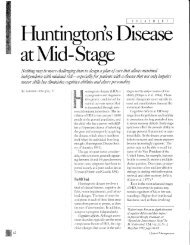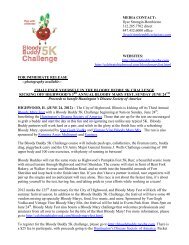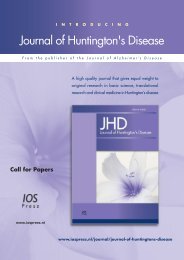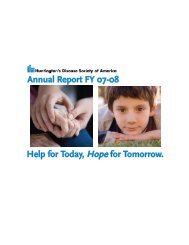Understanding Behavior in HD.final.8-18-05 - Huntington's Disease ...
Understanding Behavior in HD.final.8-18-05 - Huntington's Disease ...
Understanding Behavior in HD.final.8-18-05 - Huntington's Disease ...
Create successful ePaper yourself
Turn your PDF publications into a flip-book with our unique Google optimized e-Paper software.
38<br />
• The delicate balance of hormones <strong>in</strong> the bra<strong>in</strong> is disrupted by the presence and progression of<br />
Hunt<strong>in</strong>gton’s <strong>Disease</strong>, result<strong>in</strong>g <strong>in</strong> variations <strong>in</strong> behaviors typically regulated by hormone levels.<br />
EXAMPLES<br />
Bob is “s<strong>in</strong>gle” for the first time <strong>in</strong> 20 years but does not have the social skills to appropriately <strong>in</strong>itiate<br />
relations.<br />
Jim is tak<strong>in</strong>g a tricyclic antidepressant for a moderate depression and still desires <strong>in</strong>tercourse with his wife<br />
but is unable to susta<strong>in</strong> an erection.<br />
Julie is embarrassed about the way her body looks with constant movements; her husband is saddened that<br />
she has pulled away from their sexual <strong>in</strong>timacy.<br />
Terry has <strong>in</strong>creased his sexual relations dramatically; his family is concerned about sexually transmitted<br />
diseases.<br />
ADDRESSING THE CHANGES IN SEXUAL FUNCTIONING<br />
Each <strong>in</strong>dividual has the right to achieve his/her highest reasonable potential on the cont<strong>in</strong>uum of human<br />
sexual development. It is a misconception that <strong>in</strong>herit<strong>in</strong>g a degenerative disease will cause an end to one’s<br />
sexuality. There are several ways to better adjust to the changes that Hunt<strong>in</strong>gton’s can br<strong>in</strong>g. Most important is<br />
the need to ma<strong>in</strong>ta<strong>in</strong> communication. Readers may want to review the bullets that highlight improv<strong>in</strong>g<br />
communication and do so with your sexual relationships <strong>in</strong> m<strong>in</strong>d (see page 14). Access to supportive services,<br />
educators and counselors can also be valuable, and community health centers should be able to provide a list of<br />
local resources. Sexuality is a lifelong process of learn<strong>in</strong>g about oneself and grow<strong>in</strong>g as a social and sexual be<strong>in</strong>g.<br />
All people have a right and a need to be fully and accurately <strong>in</strong>formed about the unique pleasure, joy, and pa<strong>in</strong><br />
this aspect of identity can br<strong>in</strong>g. Remember to allow yourself to respond to change and adjust as needed.<br />
Respect the space and development of those around you, and keep <strong>in</strong> m<strong>in</strong>d that rarely is it just one party who<br />
is affected by change.<br />
SLEEP DISTURBANCES<br />
A normal sleep cycle is divided <strong>in</strong>to two dist<strong>in</strong>ct periods with brief <strong>in</strong>tervals of wakefulness. A typical<br />
night’s sleep <strong>in</strong>volves multiple cycles. One part of the cycle is non-rapid eye movement (NREM), entered when<br />
the body beg<strong>in</strong>s to slow down and eye movement stops. The bra<strong>in</strong> activity, heart rate, blood pressure and<br />
metabolism are slowed to enter <strong>in</strong>to a deep restful state. Another part of the cycle is rapid eye movement<br />
(REM). This stage is characterized by fast eye movement, dreams last<strong>in</strong>g up to thirty m<strong>in</strong>utes and the bra<strong>in</strong><br />
be<strong>in</strong>g 20 percent more active then when we are awake. NREM and REM sleep alternate <strong>in</strong> cycles throughout<br />
the night with occasional brief <strong>in</strong>tervals of wakefulness.<br />
Over 50% of older persons report that they have disturbances <strong>in</strong> their sleep. Normal ag<strong>in</strong>g br<strong>in</strong>gs about<br />
changes <strong>in</strong> sleep patterns. Older people tend to wake up more often, have lighter sleep and require a longer

















